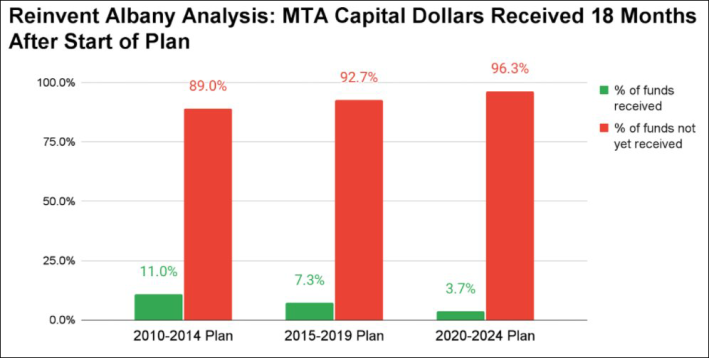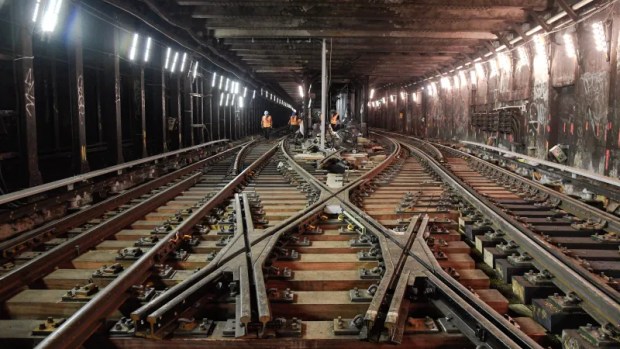Brother can you spare...a lot of dimes?
The MTA's current rehabilitation program — a historic five-year $55-billion plan to modernize signals, improve station accessibility, purchase new trains and electric buses and bring the Second Avenue Subway further into Harlem — is being starved of funding due to the state's failure to enact congestion pricing, among other things, according to a new report from Reinvent Albany.
The watchdog group's findings run counter to MTA Chief Financial Officer Bob Foran's claim in June that the agency did not need congestion pricing money in the short term — a statement that was read as an attempt to paper over Gov. Cuomo and the MTA's slow-walk of congestion pricing and one that willfully ignored that the MTA's current capital plan is taking in funds at a slower pace than ever.
The construction effort has only $2 billion in cash available right now — much lower as a percentage of the total plan that prior five-year capital plans had at this point in their rollout.
"The MTA literally cannot afford to lose congestion pricing revenues,” said Rachael Fauss, Senior Research Analyst at Reinvent Albany, the lead author and researcher of the report. “The MTA, led by Gov. Hochul, needs to quickly secure its crucial capital funding sources, including congestion pricing, as the agency recovers financially from the COVID-19 pandemic."
The lack of congestion pricing, which was supposed to have begun generating $15 billion in MTA bonding power in January, 2021, is partly to blame for destroying the MTA's best laid plans: 45 percent of the capital plan — the plurality — was supposed to be funded by congestion pricing and new sources of revenue like the internet sales tax and mansion tax, money that has barely materialized.
In addition, the MTA used $500 million from the mansion and sales taxes for basic operating funds during the depths of the agency's revenue crisis during the coronavirus pandemic, the report points out.
Congestion pricing was always the linchpin of the capital plan. But the Midtown tolling scheme was memorably delayed for two years by the Trump administration, and even after the Biden administration gave the agency instructions to complete an environmental assessment, critics have said that the pace of the review has not matched the urgency for congestion pricing. The MTA also recently indicated that the required environmental assessment, with enhanced public outreach, is going to take 16 months (not the three months it once promised), meaning that the agency won't start collecting any revenue from the traffic cordon until late 2023 at the earliest.

According to the report, the actual money for the 2020-2024 capital program is coming to the MTA at a slower pace than the 2010 and 2015 capital plans, leaving the plan only 4 percent funded through the first 18 months of the program. The previous two capital plans received $2.9 and $2.4 billion respectively in their first 18 months, the equivalent of 11 and 7 percent of the total cost of those plans.
The MTA already had to delay work on its existing capital plans in 2020 due to the pandemic, leading to a drop in total spending on planned capital work after the agency had managed to increase the pace of spending and work for six years between 2014 and 2019. Without a dedicated stream of funding for the 2020-2024 plan, the report warns that the completion of the massive modernization effort could stretch well beyond what anyone considers a reasonable timeline.
More concerning for the future of mass transit, help is not on the way. Certainly, the MTA said in July that half of the funding sources for the capital plan, including things like federal formula funding, internet sales tax and mansion tax funds and $3 billion each from New York State and New York City were "secure," but very little of that money has materialized and it's not expected to for some time. History shows that the state contribution will come near the end of the life of the plan, as it has in the 2015 plan, and the agency took a hit to its borrowing capacity when it had to take out a $3 billion federal loan to stay afloat during the depths of the pandemic.
Additionally, the $10.5 billion the agency is expecting from the federal infrastructure bill isn't close to what the transit agency was already expecting.
"There may be some false security because this infrastructure bill is on its way to passing," said TransitCenter Communications Director Ben Fried. "The [federal] bill does provide a smidge more than the MTA would be getting in normal circumstances from the feds. But there's no substitute for the congestion pricing money."
The MTA responded to the report by insisting that it doesn't need cognestion pricing's revenue right now.
"The state Legislature has previously authorized the use of additional State and City sales taxes and the mansion tax for the 2020-24 capital program and we are using such funds, which we anticipate comes to about $10 billion, including proceeds of City sales tax bonds, other bonds supported by State sales taxes and pay-as-you-go capital funds," said Senior Advisor to the MTA Chairman and CEO Ken Lovett. "Not only are these sources of funding available, but -- as publicly stated time and again--we always planned to use them before relying on revenues from congestion pricing."
But Fauss countered that the agency's claim that it was never going to rely on congestion pricing money early in the game falls apart when looking at the original timeline for the capital plan funding.
"Their original capital plan had congestion pricing beginning in 2021. So, to the extent that the MTA said the internet sales tax and mansion tax money was going to be used first, that would only be by virtue of it being in effect in the year 2020, and congestion pricing being in effect in 2021," she said.






